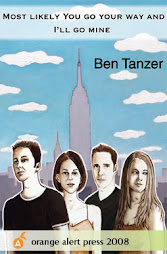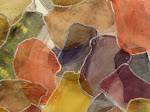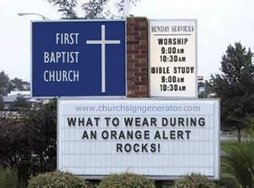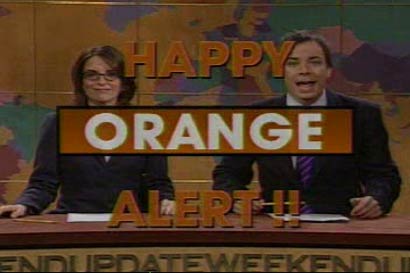 Jonathan Messinger
Jonathan MessingerIf it seems strange for a writer to perfect his skills through live performance, instant feedback, and audience interaction, then you haven't met Jonathan Messinger. As co-founder of The Dollar Store Show, a monthly event combining literature, comedy, and music, Jonathan has constructed many stories with the full intention of reading them and these shows. There is a running sense of humor throughout his work, even in the face of the most sobering issues. Several of these stories have found their way into Jonathan's first book "Hiding Out", which will be released October 1st from Featherproof Press. Jonathan is the editor-in-chief of Featherproof and takes great pride in the young press.
This past week Featherproof began to accept pre-orders for "Hiding Out" and the released the latest installment in their light reading series, a story by Jonathan entitled "Bicycle Kick". This short piece about a not quite soccer player becoming enthralled by a member of the opposing team named "Azofeifa" and taking a missile of a ball to the eye. This just happens to also be a sneak peak at one of the stories contained within "Hiding Out". However, here is the most exciting part, if you pre-order your copy Jonathan will do something very special for you. This is taken a message he sent out this week, "And, as a show of thanks, I'm writing an essay for everyone who pre-orders a copy. It's on the topic of your choice. You name it. Just put it in the little notes field when you order. Why? I have no idea". I have a feeling Jonathan is going to be a busy man over the next few months. Personally, I am debating between asking him about quantum physics and the life of jazz great Dexter Gordon.
Recently Jonathan was kind enough to take a break from essay writing to answer a few on my questions.
Orange Alert (OA): Tell us a little about what we can expect from your debut book "Hiding Out".
Jonathan Messinger (JM): Would it be completely stupid to say, "I have no idea"? People are now reading the book, which means there's an ever-widening gulf between what I thought readers would get out of it and what they are telling me. Which is fine. It's a collection of short stories, about half of them taken from The Dollar Store, the reading series I run in town. So a lot of them, I'm hoping, have a sense of humor that weaves its way through some serious topics. It's funny, because the people who have read it at this point have said, "Oh yeah, there are a lot of stories in there about relationships." But I had thought it was mostly about death. I don't know what that says about me.
OA: I really enjoyed your mini-book on the featherproof site, "Eight Permutations on the Binoculars of Power". How did the concept for that series come about?
JM: Thanks a lot. That was actually taken from a Dollar Store piece. The item was a pair of binoculars, but the whole thing got weird on me pretty quickly. I had just read Brian Joseph Davis's The Portable Altamont, a collection of really funny, bizarre pieces about celebrities. It got me in the mood for doing something a little disjointed.
OA: The Dollar Store readings have become something near legendary in and about Chicago. Where did that idea come from, and as you look back over the last few years how has it affected you as a writer?
JM: Thanks again. Honestly, the idea came from this period of stagnation that my friends and I had gone through. There were five of us who were all unemployed or underemployed, and we would have lunch from our various temp jobs now and again, and joke about doing a "creative project." But then one day I was too bored not to do something. And I figured it'd be a series that combined all of the stuff I was into at that time as either a participant—literature—or spectator—theater, comedy. The Dollar Store thing? Well, I love dollar stores.
As a writer, it's prevented me from becoming lazy. I've written a new story every month to perform in front of a crowd, which is an insanely nerve-wracking thing to do, never mind do it with a first draft (and I'm thankful to all the writers who have put themselves through it, too). It's helped me in the sense that for three years I've received immediate feedback on a lot of my stories, which is a very unusual, humbling and helpful thing. And it's definitely committed me to revision. A lot of the Dollar Store stories require a fair amount of reworking to get them going on the page. I can't footnote the different parts like, "Okay, imagine I'm using a wicked funny voice when you read this next sentence."
Chicago's literary scene has really exploded with readings in the last five years. I think you're seeing it everywhere, for a number of reasons (authors need to be more proactive about promoting their books, it's easier to get word out about events with the internet, etc.), but Chicago seems uniquely readingriffic. I think it's great, it makes for a lot of fun and helps foster a real community. Of course, it is just one part of the literary scene here, there's a whole slew of writers who don't participate in the various readings, nothing wrong with that at all. But I think it is emblematic of how Chicago writers, absent the industry that New York has, are looking for other ways to reach an audience.
Here is Jonathan reading last year at a Dollar Store Show:
OA: As co-publisher of Featherproof Books, what are some of your vision for the future of featherproof? What do you look for in new projects?
JM: As for the first question, that's a hard one. We seem to think there aren't enough challenges in small press publishing, because we keep taking on new ones. After my book is a fantastic young adult novel called "This Will Go Down on Your Permanent Record." After that is a very funny, drugged-up novel/art book called "boring boring boring boring boring boring." Each new book is a new surprise, presents new challenges, etc.
Of course, we're hoping we're getting better with each book, and picking up new audiences with each release. We want to expand a bit, be able to do more books, etc., and we've added staff recently ("staff" should be understood to mean bright, big-hearted people whom we don't pay). Our eyes are big but our wallets are small. But definitely, we'd like to make Featherproof a bigger operation. It's tough to pinpoint as far as new projects go. We're always looking for a book that really stands out, is very idiosyncratic, like it could only have come from one particular mind. I realize this is of no help whatsoever, and I apologize.
OA: Do you foresee any potential problems in the publishing industry as it relates to the internet? Will there come a time when people illegally download books as they do music?
JM: I don't think so. The thing about music is that when you download it, you can burn it onto a CD or put it on your iPod and it's in the precise form you would have it in if you'd bought it. That's not the case with books. As a writer and a publisher, I'm most interested in someone reading the work we put out, so I don't sweat how they get it too much. Besides, books are already available for free in these wonderful places called libraries. I've recently become enamored with libraries again, for like the eighth time in my life. If our readers just went to their local library and checked out our books, I'd be perfectly content. Everyone is constantly flipping out about what's going to happen with books and the Internet. I just think we'll all figure it out. To use your music analogy, if writing all becomes digitized, then printed and bound books will become literature's vinyl. So be it. Then our hipster grandkids will hang out and read books with their droid pals at their photon bars. You heard it here first.
OA: What's next for Jonathan Messinger?
JM: I'm working on a novel. It's going slowly, we'll see if it makes it the whole way. I'm also working on a choose-your-own-adventure novel that was commissioned for a fund-raiser for the Chicago Art Department. They auctioned it off: The winner picks the genre, and then answers a ridiculous survey I made up. Then I use their answers to turn him or her into the hero of the CYOA novel. Joseph Lappie, of Peptic Robot Press, is going to handcraft a cover and binding for it. I'm really pumped about it. Although, I think CYOA might be trademarked, so we'll probably call it SOPE, Select One's Personal Excitement.
Bonus Questions:
OA: Coffee? If yes, what is your favorite type of coffee and where is your favorite coffee spot?JM: I'm allergic to caffeine, so no coffee for me. I like to pretend that it's evolutionary: I've gone beyond the need for the artificial energy boost caffeine provides. But I'm actually a sleepy guy. And I'm pretty sure that if I can be killed by something that everyone has for breakfast, well, that's not really how evolution works.
OA: Who are some of your favorite musicians past and present? Does their music ever affect your writing in anyway?
JM: When I write, I listen exclusively to jazz, because I can't hear lyrics and come up with words at the same time. My brain just can't function like that. So I listen to a lot of Ornette Coleman, Charles Mingus, Miles Davis and Ken Vandermark. I love Vandermark, and am thankful he lives in Chicago. As for other musicians, at the moment I'm listening to the new Spoon album a lot, and my obsession with The Thermals has shown no sign of ebbing. I'm also constantly inspired by my pal Abraham Levitan, who co-hosts the Dollar Store with me and is lead singer of the great Baby Teeth, who are the best band in Chicago. That's not my opinion. It's science fact.
For more information on Jonathan Messinger please visit his website. To pre-order your copy of "Hiding Out" go to Featherproof Press, and to catch the next Dollar Store Show check out their website.
+by+Nick+Volkert).jpg)





















1 comment:
Nice interview. I preordered his book yesterday, actually, and am looking forward to it.
Post a Comment